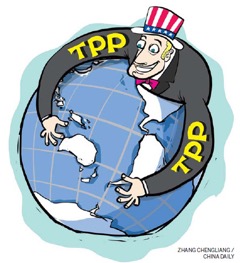
04 Jun Earth Matters: Trans-Pacific Partnership & U.S. Food Safety
Contributor Bill Mason returns after an extended absence with his column about issues that impact the health of the Big Blue Marble we live on. Below Earth Matters asks: What’s the beef with the Trans-Pacific Partnership and U.S. food safety?
Standing on his political soapbox in front of the Nike corporate headquarters in Oregon, President Obama recently campaigned for congressional approval of the Trans-Pacific Partnership (TPP), which he claims will expedite U.S. exports to Pacific Rim countries by removing trade-inhibiting tariffs and simplifying customs procedures.
“Beef is really expensive in Japan. Let’s make sure they try some Oregon steaks,” said President Obama.
At face value, opening U.S. export markets seems like a great idea. It has the potential to foster international commerce, create new employment opportunities, and stimulate our struggling economy. Therefore, it begs the question of why the majority of Democrats in Congress oppose the TPP and the majority of Republican leaders support it.
In part, Democrats dispute the ability of the TPP advisory committee to ensure social, economic, and environmental equality. Eighty-five percent of the TPP advisory committee members are industry executives or lobbyists for corporations such as Monsanto, DuPont, Cargill, and Syngenta. To boot, the Obama administration has chosen to classify the details of the TPP agreement to public view, which inhibits public feedback and support. They have also pushed for fast-tracking the TPP, which would suppress opponents’ capacity to negotiate an agreement that does not circumvent commonsense consumer safeguards.
Two of the major concerns of food safety advocates who oppose the TPP include placing limits on food labeling and the potential for foreign exporting nations to violate our food safety laws.
Contrary to America’s building support for GMO-labeling and fortifying existing food-labeling regulations, the TPP would not require exporting nations to provide information on the origin of food products. In doing so, the TPP agreement could undermine consumers’ capability to use purchasing power as a political tool to address issues related to social, economic, and environmental inequality. It could also prevent mandated GMO labeling and consumers’ rights to food processing information.
Compounding the problem, the TPP would allow domestic food inspections to be outsourced to foreign countries if they merely claim that their food processing standards are equivalent to our own standards even if their standards violate key U.S. food safety principles.
The precedent to ensure that all meat products produced in America are fit for human consumption was established by President Roosevelt in 1906 with the enactment of the Federal Meat Inspection Act. This is not to say that large-scale industrial farming does not have detrimental social, economic, or environmental consequences — Europe has banned U.S. beef due to our use of growth hormone injections — merely that our current food safety system has prevented other countries from importing meat products that fail to meet our standards. In opposition to these standards, the TPP would allow foreign corporations to challenge any U.S. food safety regulation on pesticide use or processing that exceeds international standards. In turn, any U.S. food safety rule could be challenged as an illegal trade barrier, which ultimately might force the U.S. to allow unsafe food products to be imported under the threat of trade sanctions.
In light of these potential threats, Senators Elizabeth Warren (D-Massachusetts) and Sherrod Brown (D-Ohio) have demanded that the Obama administration put an end to the “secret deals” embedded within the TPP agreement, allow full public disclosure of the agreement’s text, and create a mechanism for public input on the agreement’s text. In support of their demands, Warren and Brown contend that former President George W. Bush’s full public disclosure of the negotiations leading up to a proposed free trade deal with Latin America sets a precedent for transparency. According to Debbie Barker, international and trade program director at the Center for Food Safety (CFS), “Our food safety policies in this country should not be dictated by a closed-door trade tribune.”
Thus, the TPP is not really a free-trade agreement, but rather an investors’ rights agreement that intends to bypass national laws to ensure corporate profits at the expense of human health and freedom.
As Henry Kissinger frequently stated, “Control oil and you control nations; control food and you control the people.”
About Billy Mason:
Billy Mason is the former Sustainability Program Coordinator for the Research Corporation University of Hawai’i, Environmental Studies Instructor at Prescott College, Researcher for the Aspen Global Change Institute, Eco-tourism Consultant for the Sewalanka Foundation, Board member for Sheep Mountain Alliance, and Community Outreach Coordinator for the EPA funded Science of Sustainability and Water Conservation projects. In addition, he continues to volunteer as a Climate Steward for NOAA, a Climate Leader for The Climate Reality Project, and a science instructor at the Mokupapapa Discovery Center in Hawai’i. Billy is also an alumnus of the University of Hawai’i at Hilo, Prescott College, and the Clinton Global Initiative University. His research focused on sustainability, environmental policy, and climate change planning. As an accomplished geographer, mountaineer, aviator, and surfer who has worked around the world from Telluride to Sri Lanka, Billy has manifested a personal connection with nature’s elements and a diversity of cultures.




Sorry, the comment form is closed at this time.